#Oracle WebLogic Server Training
Explore tagged Tumblr posts
Text
What Oracle Skills Are Currently In High Demand?

Introduction
Oracle technologies dominate the enterprise software landscape, with businesses worldwide relying on Oracle databases, cloud solutions, and applications to manage their data and operations. As a result, professionals with Oracle expertise are in high demand. Whether you are an aspiring Oracle professional or looking to upgrade your skills, understanding the most sought-after Oracle competencies can enhance your career prospects. Here are the top Oracle skills currently in high demand.
Oracle Database Administration (DBA)
Oracle Database Administrators (DBAs) are crucial in managing and maintaining Oracle databases. Unlock the world of database management with our Oracle Training in Chennai at Infycle Technologies. Organizations seek professionals to ensure optimal database performance, security, and availability. Key skills in demand include:
Database installation, configuration, and upgrades
Performance tuning and optimization
Backup and recovery strategies using RMAN
High-availability solutions such as Oracle RAC (Real Application Clusters)
Security management, including user access control and encryption
SQL and PL/SQL programming for database development
Oracle Cloud Infrastructure (OCI)
With businesses rapidly moving to the cloud, Oracle Cloud Infrastructure (OCI) has become a preferred choice for many enterprises. Professionals skilled in OCI can help organizations deploy, manage, and optimize cloud environments. Key areas of expertise include:
Oracle Cloud Architecture and Networking
OCI Compute, Storage, and Database services
Identity and Access Management (IAM)
Oracle Kubernetes Engine (OKE)
Security Best Practices and Compliance in Cloud Environments
Migration strategies from on-premises databases to OCI
Oracle SQL And PL/SQL Development
Oracle SQL and PL/SQL are fundamental database developers, analysts, and administrators skills. Companies need professionals who can:
Write efficient SQL queries for data retrieval & manipulation
Develop PL/SQL procedures, triggers, and packages
Optimize database performance with indexing and query tuning
Work with advanced SQL analytics functions and data modelling
Implement automation using PL/SQL scripts
Oracle ERP And E-Business Suite (EBS)
Enterprise Resource Planning (ERP) solutions from Oracle, such as Oracle E-Business Suite (EBS) and Oracle Fusion Cloud ERP, are widely used by organizations to manage business operations. Professionals with rising experience in these areas are highly sought after. Essential skills include:
ERP implementation and customization
Oracle Financials, HRMS, and Supply Chain modules
Oracle Workflow and Business Process Management
Reporting and analytics using Oracle BI Publisher
Integration with third-party applications
Oracle Fusion Middleware
Oracle Fusion Middleware is a comprehensive software suite that facilitates application integration, business process automation, and security. Professionals with experience in:
Oracle WebLogic Server administration
Oracle SOA Suite (Service-Oriented Architecture)
Oracle Identity and Access Management (IAM)
Oracle Data Integration and ETL tools
The job market highly values Java EE and Oracle Application Development Framework (ADF).
Oracle BI (Business Intelligence) And Analytics
Data-driven decision-making is critical for modern businesses, and Oracle Business Intelligence (BI) solutions help organizations derive insights from their data. In-demand skills include:
Oracle BI Enterprise Edition (OBIEE)
Oracle Analytics Cloud (OAC)
Data warehousing concepts and ETL processes
Oracle Data Visualization and Dashboarding
Advanced analytics using machine learning and AI tools within Oracle BI
Oracle Exadata And Performance Tuning
Oracle Exadata is a high-performance engineered system designed for large-scale database workloads. Professionals skilled in Oracle Exadata and performance tuning are in great demand. Essential competencies include:
Exadata architecture and configuration
Smart Flash Cache and Hybrid Columnar Compression (HCC)
Exadata performance tuning techniques
Storage indexing and SQL query optimization
Integration with Oracle Cloud for hybrid cloud environments
Oracle Security And Compliance
Organizations need Oracle professionals to ensure database and application security with increasing cybersecurity threats. Key security-related Oracle skills include:
Oracle Data Safe and Database Security Best Practices
Oracle Audit Vault and Database Firewall
Role-based access control (RBAC) implementation
Encryption and Data Masking techniques
Compliance with regulations like GDPR and HIPAA
Oracle DevOps And Automation
DevOps practices have become essential for modern software development and IT operations. Enhance your journey toward a successful career in software development with Infycle Technologies, the Best Software Training Institute in Chennai. Oracle professionals with DevOps expertise are highly valued for their ability to automate processes and ensure continuous integration and deployment (CI/CD). Relevant skills include:
Oracle Cloud DevOps tools and automation frameworks
Terraform for Oracle Cloud Infrastructure provisioning
CI/CD pipeline implementation using Jenkins and GitHub Actions
Infrastructure as Code (IaC) practices with Oracle Cloud
Monitoring and logging using Oracle Cloud Observability tools
Oracle AI And Machine Learning Integration
Artificial intelligence (AI) and machine learning (ML) are transforming businesses' operations, and Oracle has integrated AI/ML capabilities into its products. Professionals with expertise in:
Oracle Machine Learning (OML) for databases
AI-driven analytics in Oracle Analytics Cloud
Chatbots and AI-powered automation using Oracle Digital Assistant
Data Science and Big Data processing with Oracle Cloud are highly demanding for data-driven decision-making roles.
Conclusion
The demand for Oracle professionals grows as businesses leverage Oracle's powerful database, cloud, and enterprise solutions. Whether you are a database administrator, cloud engineer, developer, or security expert, acquiring the right Oracle skills can enhance your career opportunities and keep you ahead in the competitive job market. You can position yourself as a valuable asset in the IT industry by focusing on high-demand skills such as Oracle Cloud Infrastructure, database administration, ERP solutions, and AI/ML integration. If you want to become an expert in Oracle technologies, consider enrolling in Oracle certification programs, attending workshops, and gaining hands-on experience to strengthen your skill set and stay ahead in the industry.
0 notes
Text
Best SailPoint Online Training for Career Growth - Visualpath
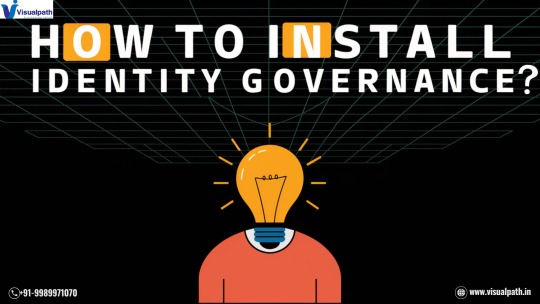
How to Install IdentityIQ for Identity Governance?
SailPoint Online Training IdentityIQ (IIQ) is a leading identity governance and administration (IGA) solution that helps organizations efficiently manage user identities, roles, and access rights. The installation of IdentityIQ forms the foundation for enabling organizations to leverage its robust features such as identity lifecycle management, access governance, and compliance controls. This guide provides a detailed overview of the IdentityIQ installation process, offering key insights into prerequisites, installation steps, and best practices SailPoint Online Training.
Prerequisites for Installation
Check that the following conditions are met before proceeding with the installation
Hardware Requirements:
Processor: Minimum 4-core CPU, recommended 8-core or higher for production environments.
Memory: At least 8 GB of RAM for testing environments and 16 GB or more for production.
Disk Space: A minimum of 100 GB of free disk space is required to store logs, configurations, and application data.
Software Requirements:
Operating System:
Supported OS includes Linux (preferred) and Windows Server.
Ensure all relevant OS patches and updates are installed.
Java Development Kit (JDK):
Install the supported JDK version for IdentityIQ (usually JDK 11 or 17 based on the release).
Set the JAVA_HOME environment variable appropriately.
Application Server:
Apache Tomcat (recommended) or other supported application servers such as JBoss or WebLogic.
Database:
Supported databases include Oracle, Microsoft SQL Server, MySQL, or PostgreSQL.
Configure the database with appropriate schemas and user permissions.
Additional Requirements:
Internet access for downloading dependencies and updates.
Administrative privileges for performing installations.
IdentityIQ installation files and license keys provided by SailPoint.
Steps to Install IdentityIQ
Follow these steps to successfully install IdentityIQ:
Step 1: Prepare the Environment
Ensure the server meets the hardware and software prerequisites.
Create a dedicated user account for running the IdentityIQ application to enhance security.
Verify that the database server is up and running, and create a database schema specific to IdentityIQ SailPoint Online Training.
Step 2: Install the Application Server
Download and install Apache Tomcat (or your chosen application server) on the server.
Configure the server.xml file within Tomcat to include specific ports and context paths for IdentityIQ.
Allocate sufficient JVM memory in the Tomcat startup scripts (catalina.sh or catalina.bat).
Step 3: Deploy the IdentityIQ Application
Obtain the IdentityIQ WAR file from SailPoint.
Place the WAR file into the webapps directory of your application server.
Start the application server to extract the WAR file and deploy IdentityIQ.
Verify the deployment by navigating to http://:/identityiq in a web browser.
Step 4: Configure the Database
Navigate to the IdentityIQ WEB-INF directory.
Locate and edit the iiq.properties file to configure database connection parameters:
database.url=jdbc:<database_type>://<host>:<port>/<database_name>
database.username=<db_username>
database.password=<db_password>
Test the database connection using the IdentityIQ database utilities.
Execute the database scripts provided in the IdentityIQ installation package to initialize the schema.
Step 5: Initialize IdentityIQ
Launch the IdentityIQ setup wizard by accessing the application URL.
Provide the necessary configurations, such as:
Administrator account details.
Email server configuration for notification alerts.
.LDAP/Active Directory integration if applicable.
Complete the wizard to initialize the IdentityIQ instance.
Best Practices for Installation
Plan for Scalability: Configure the hardware and software to handle future growth in user accounts and access policies.
Use a Dedicated Server: Deploy IdentityIQ on a separate server to prevent conflicts with other applications.
Secure Connections: Use SSL/TLS for all communication between clients, servers, and databases.
Backup Configuration Files: Maintain regular backups of critical files like iiq.properties, database schemas, and logs.
Follow Documentation: Refer to the official SailPoint documentation for version-specific details.
Post-Installation Checklist
Verify that IdentityIQ is accessible via the configured URL.
Test basic functionalities such as user login, access requests, and reporting.
Enable monitoring tools to track application performance and usage.
Apply patches or updates provided by SailPoint to address known issues SailPoint Online Training.
Document the installation process for future reference and audits.
Troubleshooting Tips
Deployment Issues:
Check the Tomcat logs for errors during WAR file deployment.
Ensure the JAVA_HOME and database configurations are correct.
Database Connectivity:
Validate the database credentials and network connectivity.
Ensure the JDBC driver is compatible with your database.
Application Performance:
Monitor JVM heap usage and adjust memory allocation if necessary.
Disable unnecessary services or features to improve responsiveness.
Installing IdentityIQ is a critical first step toward implementing effective identity governance. This guide provides a clear roadmap for organizations to complete the installation process smoothly and efficiently. With a properly configured IdentityIQ instance, businesses can enhance their security posture, streamline compliance, and optimize identity management processes.
Visualpath is the Leading and Best Institute for learning in Hyderabad. We provide Sailpoint Identity IQ Online Training. You will get the best course at an affordable cost.
Attend Free Demo
Call on – +91-9989971070
Blog: https://topsailpointcourse.blogspot.com/
What’s App: https://www.whatsapp.com/catalog/919989971070/
Visit: https://www.visualpath.in/sailpoint-online-training.html
#SailPoint Online Training#Sailpoint Course#Sailpoint Training in Hyderabad#Sailpoint Online Course#Sailpoint Training Institutes in Hyderabad#Sailpoint Identity IQ Course Online#Sailpoint Identity IQ Online Training
0 notes
Text
Oracle Fusion SCM: Technical Architecture and Integration
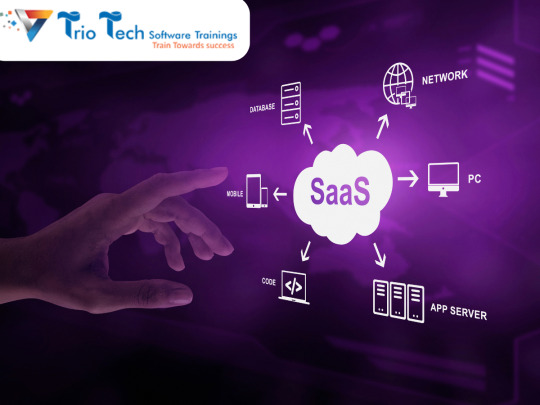
Oracle Fusion Supply Chain Management (SCM) is a powerful tool designed to modernize and improve supply chain operations. Its strong technical structure and easy integration features help businesses optimize their supply chains effectively.
Technical Architecture
Oracle Fusion SCM is built on Oracle’s Fusion Middleware, providing a flexible, scalable, and secure foundation for business applications. Key parts of its structure include:
1. Service-Oriented Architecture (SOA): Oracle Fusion SCM uses SOA, which makes it easy to share and reuse services across different modules. This design allows for easier management and updates of individual parts without affecting the entire system.
2. Oracle Cloud Infrastructure (OCI): Hosted on OCI, the platform ensures high performance, reliability, and security. OCI provides strong computing power, storage, and networking, essential for managing large-scale supply chains.
3. Application Development Framework (ADF): Oracle ADF is used to create user interfaces and business logic. This framework simplifies the development process and improves the user experience with a rich set of tools.
4. Oracle Database: The core of Oracle Fusion SCM is the Oracle Database, known for its reliability, scalability, and strong data management features. It supports complex transactions and ensures data consistency across the supply chain.
Integration Capabilities
Oracle Fusion SCM excels at integration, helping businesses connect different systems and streamline operations. Key integration features include:
1. Oracle Integration Cloud (OIC): OIC provides a platform for integrating applications, data, and processes. It has pre-built connectors for various Oracle and third-party applications, making integration easier and faster.
2. Application Programming Interfaces (APIs): Oracle Fusion SCM offers many RESTful and SOAP APIs for seamless data exchange between systems. These APIs help businesses integrate their existing ERP systems, CRM solutions, and other applications with Oracle Fusion SCM.
3. Data Integration Tools: Oracle Data Integrator (ODI) and Oracle GoldenGate are essential for data integration. ODI handles data movement and transformation, while GoldenGate supports real-time data replication and synchronization, ensuring all systems have up-to-date information.
4. Process Integration: Oracle BPM Suite integrates business processes across different applications, enabling workflow automation and process orchestration. This streamlines supply chain operations and reduces the need for manual intervention.
5. Middleware Solutions: Oracle Fusion Middleware includes tools like Oracle SOA Suite, Oracle WebLogic Server, and Oracle Service Bus, which help connect different systems and manage integration processes.
Conclusion
Oracle Fusion SCM’s technical architecture and integration capabilities make it a powerful solution for modernizing supply chain management. Its modular SOA design, robust infrastructure on OCI, and extensive integration options help businesses manage their supply chains efficiently and adapt to market changes. By using these features, organizations can achieve higher operational efficiency, flexibility, and a competitive edge in the global market.
Elevate your supply chain management expertise with Triotech Software’s comprehensive online training for Oracle Fusion SCM. Our expert-led courses are designed to provide in-depth knowledge and hands-on experience with Oracle’s powerful SCM solutions. Whether you’re a beginner looking to get started or a professional aiming to refine your skills, our training covers everything from basic functionalities to advanced integration techniques. With flexible learning schedules, interactive sessions, and real-world case studies, Triotech Software ensures you gain practical skills that can be immediately applied in your workplace. Join us to master Oracle Fusion SCM and propel your career to new heights with industry-leading training from Triotech Software.
0 notes
Text
What are the prerequisites for enrolling in the Fusion Financials Training program?
If you're interested in learning about Oracle Fusion Financials and enrolling in the Fusion Financials Training program, you may be wondering what the prerequisites are. In order to get the most out of the course and succeed in implementing and managing Oracle Fusion Financials in your organization, there are a few requirements you should meet before enrolling in the training program.
The first prerequisite for enrolling in the Fusion Financials Training program is a basic understanding of finance and accounting principles. The course assumes that you have a fundamental knowledge of finance and accounting, including concepts such as general ledger, accounts payable, accounts receivable, and financial reporting. If you don't have a background in finance and accounting, it's recommended that you take a basic course or gain some experience in these areas before enrolling in the Fusion Financials Training program.
The second prerequisite is a basic understanding of the Oracle Financials Cloud suite. This includes a familiarity with the user interface and navigation of the Oracle Financials Cloud suite. If you don't have experience using Oracle Financials Cloud, it's recommended that you take a basic course or gain some experience with the suite before enrolling in the Fusion Financials Training program.
The third prerequisite is a basic understanding of the Oracle Fusion Middleware. This includes a familiarity with the components of the middleware, such as Oracle WebLogic Server, Oracle SOA Suite, and Oracle Identity Management. If you don't have experience with Oracle Fusion Middleware, it's recommended that you take a basic course or gain some experience with the middleware before enrolling in the Fusion Financials Training program.
The fourth prerequisite is a basic understanding of the Oracle Fusion Applications architecture. This includes a familiarity with the different layers of the architecture, such as the database layer, application layer, and presentation layer. If you don't have experience with the Oracle Fusion Applications architecture, it's recommended that you take a basic course or gain some experience with the architecture before enrolling in the Fusion Financials Training program.
Finally, it's recommended that you have access to an Oracle Fusion Financials environment in order to practice and apply the concepts learned in the training program. This can be either an on-premise installation or a cloud-based implementation.
In conclusion, the prerequisites for enrolling in the Fusion Financials Training program include a basic understanding of finance and accounting principles, the Oracle Financials Cloud suite, Oracle Fusion Middleware, Oracle Fusion Applications architecture, and access to an Oracle Fusion Financials environment. Meeting these requirements will help you get the most out of the course and successfully implement and manage Oracle Fusion Financials in your organization.
0 notes
Text
Oracle WebLogic Server Online Training in Hyderabad
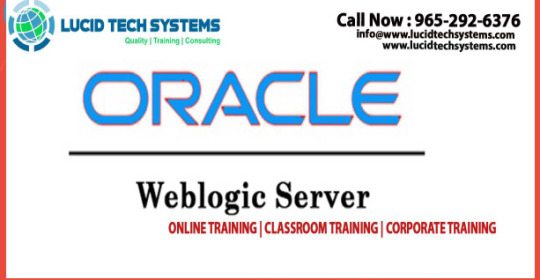
Learn Weblogic Online Course
LucidTechSystems has come to existence to provide people the knowledge about latest trends in technology. We provide a team of trainers who will put across a through and detailed idea about the respective technical courses that you wish to explore. LucidTechSystems gives opportunity to work on Real Time Projects which would be guided by our real time trainers. A technical back end team would always be available to answer your queries at any point of time and will also assist you to arrange your training sessions.
Best Online Weblogic Training by LucidTechSystems is an eminent career program which is delivered from the hands of real-time domain experts. Our training institute is highly acclaimed for its well-endowed& highly advanced career-oriented training program. The soaring demand for the certified professionals in Weblogic Training across the global industry level is well handled by our institute by nurturing the best set of skill sets among the students & by molding them into becoming dominant Weblogic professionals. Getting enrolled for our institutes Weblogic Training in Hyderabad and as well as Best Weblogic Corporate Training In Hyderabad will surely help the aspirants towards boosting their career graph in this ingenious technology.
Weblogic Training empowers to oversee revenue recognition. It robotizes and rearranges the revenue recognition and accounting process. With LucidTechSystems the Weblogic Training in USA is composed by best industry specialists and the Weblogic Online training instructional exercise is set up with best industry refreshes for offering members best proficient understanding over modules and after finishing of preparing we give Weblogic Corporate Training. The numerous opportunities which are made available in this highly prolific dynamic field can be grabbed with the help of top-notch Weblogic Training in Hyderabad delivered by the LucidTechSystems.
Who Can Take Weblogic Training?
Weblogic Training in Hyderabad which is currently being delivered by LucidTechSystems will be the best fit for all the aspirants who are very keen towards securing a career in this domain.
The major set of targeted audiences for the Weblogic Training program is
Technology Professionals
Software Specialists
Market Professionals
Job Aspirants
Career Enthusiasts
Course Objectives Of Weblogic Training in Hyderabad
Best Weblogic Training in USA which is being provided by our institute offers different types of learning modules which mainly include
WebLogic Server Overview
Installing and Patching WebLogic Server
History of Application Servers
Creating Domains
Web Logic Server Life Cycle Process
Weblogic Clusters
Assembling Applications (packing)
Deploying Applications
Configuring JDBC
JMS (Java Messaging Service)
WebLogic Server Security- Secure Socket Layer (SSL)
Apache HTTP Server Configuration and integration with Weblogic Server
WebLogic Scripting Tool (WLST i.e. command Mode Administration)
Node Manager-WebLogic Server Startup and Crash Recovery
Performance Monitoring
Backing Up and Restoring a Domain
LucidTechSystems is the best web based preparing foundation in Hyderabad to give well-ordered course from fundamental to progress on Weblogic. In LucidTechSystems all trainers are well experts and providing training with practically. Here we are teaching from basic to advance. Our real time trainers fulfill your dreams and create professionally driven environment. In Weblogic training we are providing sample live projects, materials, explaining real time scenarios, Interview skills.
Benefits Of Weblogic Online Training
LucidTechSystems is one of the best quality Weblogic Training center for online, in-house, corporate training in Hyderabad to different reputed companies. LucidTechSystems is the best Weblogic online training institute in Hyderabad. In India LucidTechSystems best Online Courses, In house Courses providing in top cities like Hyderabad Bangalore, Chennai, Pune, Mumbai, Delhi, Etc. LucidTechSystems have trainer from IT industry who is working professionals
Weblogic Training in Hyderabad offered by our LucidTechSystems is widely renowned for its real-time based training approach that helps the audience to gain the best exposure towards handling the real-world industry challenges of this domain. With an Up-To-Date Course curriculum, LucidTechSystems stands at the top of institutes delivering real-time based Weblogic Training in Hyderabad and Weblogic Corporate Training in Hyderabad.
We provide all recordings for classes, materials, sample resumes, and other important stuff. Weblogic Online Training We provide Weblogic Online Training through worldwide like India, USA, Japan, UK, UAE, Malaysia, Singapore, Australia, Sweden, South Africa, and etc. Weblogic Corporate Training LucidTechSystems providing corporate training worldwide depending on Company requirements with well experience real time experts.
#Oracle WebLogic Server Online Training in Hyderabad#oracle WebLogic Server Training in Hyderabad#Oracle WebLogic Server Training#Oracle WebLogic Server Online Training
1 note
·
View note
Text
Oracle WebLogic Server Training in Hyderabad
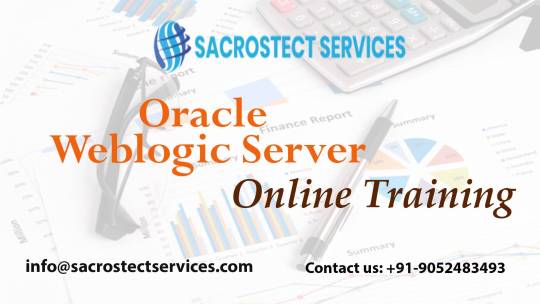
Sacrostect Services is a One of the best quality training center for online, Classroom and Corporate Training In Hyderabad. WebLogic Server is the outward-confronting segment of Oracle Fusion WebLogic Platform that gives you a chance to give a UI to coordinate your applications. WebLogic Server gives you a chance to surface application information and usefulness from heterogeneous situations into a coordinated, dynamic, and adaptable Web-based entry UI that can at the same time bolster your clients, accomplices, and workers on various gadgets. WebLogic Server handles the framework with the goal that you can concentrate your advancement endeavors on what is most critical your applications.
Not with standing an effective entrance structure and its J2EE security establishment, WebLogic Server gives numerous business administrations, for example, content administration, groups, personalization, pursuit, and client administration.
Sacrostect Services is the best instructional center point. Sacrostect Services is currently the best trusted institute delivering pure real-time based WebLogic Online Training in Hyderabad. Sacrostect Services have control from IT industry who is working specialists. So they have live working information on WebLogic Server. At Sacrostect Services you can accomplish free demo, so you will get a through thought regarding the course. We are currently the best trusted deliver of Best WebLogic Online Training & as well as the Best WebLogic Corporate Training in Hyderabad
Contact us: Mobile: +91-9052483493 Email: [email protected]
#oracle weblogic server training in hyderabad#oracle weblogic training in hyderabad#WebLogic Training in Hyderabad#WebLogic Online Training in Hyderabad
0 notes
Video
Sailpoint IdentityIQ tutorial 1 - Hardware and Software requirements In this SailPoint tutorial we discussed the various hardware and software requirements for SailPoint Installation. 🔥 Lab - Linux 7 installation 📌 Live training on Sailpoint IdentityIQ To know more kindly visit- https://www.identityclasses.com/courses/sailpoint-identityiq/ For any queries drop us an ✉️ email at [email protected] or WhatsApp us on +919046881874.
In this SailPoint IIQ tutorial we are going to discuss the various software and hardware requirements for installing SailPoint. As part of Software requirements we need - 1. Database (Oracle DB, MySQL, or IBM's DB2) 2. Java Virtual Machine (Oracle Java or OpenJDK) 3. Application Server (Apache Tomcat or WebLogic) 4. SailPoint software binaries.
Hardware requirements for Sailpoint depend on the footprint. A Footprint is a hardware deployment topology that supports the Sailpoint installation of a certain scale. As per Sailpoint, five different types of footprint exist depending upon the number of identities, applications, etc. 1. Sailpoint Micro Footprint - It is a small, non-production installations of up to 5K Identity objects. In this footprint, IdentityIQ server and the database server resides on the same machine/host. The server configuration should be 1 or 2 core processor with 4 GB RAM and 40 GB of block storage space. 2. Sailpoint Small footprint - It supports installation up to 10K Identity objects. This footprint requires 2 servers. One server is combined with the IdentityIQ application and database, while the other will only have the IdentityIQ application. The server configuration should be a 4-core processor with 8 GB of RAM and 250 GB of RAID protected DB block storage space. 3. Sailpoint Medium footprint - It supports installations of 10K to 50K Identity objects. This footprint requires 4 servers. One dedicated server for the database. One dedicated server for the UI. Two dedicated servers for Tasks/Batch. The Task server configuration should be a 4-core processor with 64-bit OS, 8 GB of RAM and 50GB of local block storage space for binaries and logs. The UI server configuration should be a 4-core processor with 64-bit OS, 8 GB of RAM, and 40GB of local block storage space for binaries and logs. The database server configuration should be a 4-core processor with 64-bit OS, 64GB RAM and 500GB of RAID protected DB storage plus 20 GB of RAID protected storage for OS files. 4. Sailpoint Large footprint - It supports installations of 50K to 500K Identity objects. This footprint requires 5 servers. One dedicated server for the database. Two dedicated servers for the UI and two dedicated servers for Tasks/Batch. The Task and UI server configuration should be a 4-core processor with 64-bit OS, 8 GB of RAM and 50GB of local block storage space for binaries and logs. The database server configuration should be an 8-core processor with 64-bit OS, 128GB RAM, and 1 TB of RAID protected DB storage plus 20 GB of RAID protected storage for OS files. 5. Sailpoint CALL Footprint - It supports installations over 500K Identity objects.
In the last part of the video we also discussed how to download all software that is required for SailPoint installation. At the end we installed Oracle Linux 7 in the VirtualBox.
👍 Subscribe us - https://www.youtube.com/channel/UCFtuzrsxfKmU03X-IUomz7A?sub_confirmation=1 ✔️ Website - https://www.identityclasses.com ✔️ Blog - https://blog.identityclasses.com ✔️ LinkedIn - https://www.linkedin.com/company/identityclasses ✔️ Twitter - https://twitter.com/classesidentity 🔥 Sailpoint IdentityIQ tutorial
1 note
·
View note
Text
Oracle Identity Manager Training
Oracle Identity Manager Online Training Course
Oracle identity manager training allows you to have a full grip on this area of the oracle software, from creating authorization and authentication policies to secure resources, configuring, deploying, and registering Webgates. Additionally, participants will also comprehend single sign-on and session management. Technical Administrators, Sales Consultants, Support Engineers, Security Administrators, Web Administrators, and Technical Consultants are the ideal candidates for oracle training.
Prerequisite
Good familiarity with a Linux-based environment
A general understanding of LDAP concepts
Who’s This Course For?
Administrator
Analyst
End User
Implementer
Systems Administrator
Module 1: Oracle Identity Manager 11gR2
Introduction
Module 2: Understanding Identity Management and Identity Governance
Identity Management: Overview, Importance, Benefits, Values
How Can Identity Management Help?
Identity Management: Terminology and Functions
Identity Governance: Infrastructure and Benefits
Oracle Identity Management Products
Oracle Identity Governance Suite: Overview and Features
Oracle Identity Manager Architecture
Installing and Configuring Oracle Identity Manage
Module 3: Launching Oracle Identity Manager
Oracle WebLogic Server
Oracle Identity Manager Server Overview
SOA Server Overview
Oracle Identity Manager Interfaces
Accessing the Oracle Identity Manager Web Consoles
Design Console Overview
Oracle SOA Consoles Overview
Module 4: Understanding Organizations, Roles, and Users
Oracle Identity Manager Users
Oracle Identity Manager Organizations, Roles, and Entity Relationships
Loading User and Role-Based Data with the Bulk Load Utility
Creating and Managing Users, Roles, and Organizations
Customizing and Saving Searches
Module 5: Using Predefined Connectors (Initial Onboarding)
Oracle Identity Manager Connectors: Overview
Types of Oracle Identity Manager Connectors
Transferring Oracle Identity Manager Connectors
Using Oracle Identity Manager Connectors: Setup
Using Oracle Identity Manager Connectors: Run Time
Module 6: Understanding Provisioning
Resources
Oracle Identity Manager Connectors
Differences Between Assigning Resources and Provisioning Resources
Assigning Resources to Users: Overview
Types of Provisioning
Using Criteria to Provision a Resource to a User
Module 7: Requests
Understanding Requests
Deploying SOA Composites
Managing Approval Workflows
Creating Requests
Approving Requests
Accessing the Resource
Module 8: Understanding Application Instances for Disconnected Resources
Application Instances
Disconnected Resources
Using Disconnected Resources
Module 9: Understanding Reconciliation
Reconciliation and Provisioning
Authoritative and Account Reconciliation
Implementing Reconciliation Workflows
Module 10: Understanding Oracle Identity Manager Security
Comparing Authorization and Authentication
Understanding Authorization Policies and Administrative Roles
Managing Administrative Roles
Module 11: Managing Reports
Types of Reports
Configuring Oracle BI Publisher
Creating Reports
Customizing Reports
Module 12: Auditing, Monitoring, and Logging for Oracle Identity Manager
What Is Auditing?
Oracle Identity Manager Audit Engine
What Is Monitoring?
What Is Logging?
Managing Auditing, Monitoring, and Logging
Module 13: Customizing Oracle Identity Manager
Oracle Identity Manager Interfaces
Customizing an Interface
Branding the Identity Self Service Console
Modifying Functionality
Module 14: Transferring Oracle Identity Manager Configurations
Deployment Manager Overview
Sandbox Overview
Exporting and Importing Configuration Data
Module 15: Troubleshooting Oracle Identity Manager
The Diagnostic Dashboard
Troubleshooting Oracle Identity Manager
Module 16: Integrating the Oracle Identity Governance Suite
Oracle Identity Governance Suite
Integration: Oracle Identity Manager and Oracle Privileged Account Manager
Integration: Oracle Identity Manager and Oracle Identity Analytics
INTERNATIONAL STUDENT FEE: 1000 USD
Flexible Class Options
Corporate Group Trainings Available | Fast-Track
Week End Classes For Professionals SAT | SUN
Online Classes – Live Virtual Class (L.V.C), Online Training
0 notes
Text
BEST ORACLE WEBLOGIC ONLINE TRAINING IN HYDERABAD
WEBLOGIC SERVER 11G/12C ADMINISTRATION TRAINING
Lucidtechsystems is a brand and providing quality Oracle WebLogic Training in Hyderabad through Online,Classroom,Corporate,Weekends and Fast track training on demand to thestudents in worldwide .LucidTechSystems is one best Oracle WebLogic server 11g/12c traininginstitute in Hyderabad and providing IT End-to-End training with real-time hands-onexposure through the IT Experts to the students.
Highlights In Our WebLogic Training Service:
In LucidTechSystems all faculties or trainers have experienced the pleasure of training andtrained Resources is accessible all over the world. LucidTechSystems Training leads to excel understanding, IT Industry latest skills requirement and proficiency with consulting services. Lucid Tech Systems help out along with WebLogic training in certification programs,Resume preparation, Boost Interview skills, Live Project life cycle, evolution,clarifying Doubts through Questions and Answers Method, Providing the Material with Video Sessions, troubleshooting bugs or issues in different target environment such as DEVELOPMENT,TESTING, QA, UAT, STAGE and PRODUCTION, support the novel thoughts.
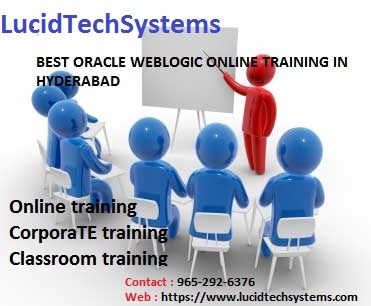
Lucid Tech Systems is one best Oracle WebLogic Training through online and offline or classroom training center in Hyderabad, We also provide WebLogic online training in USA states California,Texas,NewJersey,NewYork Australia, South Africa etc.
What you will learn In WebLogic Training:
This oracle WebLogic training course trains Web administrators on techniques for installing and configuring Oracle WebLogic Server 11g. It also trains Web administrators to deploy Java EE applications to Oracle WebLogic Server 11g using Administration Console and command-line and scripting tools like WLST.
1 note
·
View note
Text
Mastering Oracle WebLogic Server 12c Administration: A Comprehensive Guide
In the contemporary world of advanced databases and complex server management, Oracle WebLogic Administration Certification stands as a highly sought-after accreditation. With the fast-paced digital transformation and the need for robust server management, Oracle WebLogic Server 12c Administration I is becoming an essential aspect of the IT world. Why is Oracle WebLogic Server 12c Administration I so Important? Oracle WebLogic Server is a highly scalable enterprise-level application server that helps in the deployment of mission-critical applications. With the Oracle WebLogic Administration Certification, professionals can effectively manage and maintain an Oracle WebLogic Server environment, ensuring seamless business operations. What Makes Oracle WebLogic Server 12c Administration Special? Oracle WebLogic Server 12c Administration is not just about server management; it's about mastering the art of maintaining a server environment that is fast, secure, and highly efficient. This makes the Oracle WebLogic Server 12c Administration I course a must-have for aspiring server administrators. Comprehensive Guide to Master Oracle WebLogic Server 12c Administration Koenig Solutions offers a comprehensive guide to mastering Oracle WebLogic Server 12c Administration. This course is an excellent blend of practical and theoretical knowledge, ensuring that professionals get hands-on experience in managing a WebLogic Server environment. Why Choose Koenig Solutions for Oracle WebLogic Server 12c Administration Training? Koenig Solutions is a globally recognized training provider with a mission to deliver the best learning experience. The Oracle WebLogic Server 12c Administration I training provided by Koenig Solutions is designed to equip professionals with the skills necessary to manage and troubleshoot Oracle WebLogic Server 12c. The course covers various topics such as installation and configuration of WebLogic Server, deploying Java EE Applications, securing a WebLogic Server domain, and much more. This comprehensive guide ensures that professionals are well-equipped to manage an Oracle WebLogic Server 12c environment efficiently. In conclusion, mastering Oracle WebLogic Server 12c Administration is an essential skill for IT professionals in the current digital landscape. With the comprehensive guide provided by Koenig Solutions, professionals can confidently embark on their journey to become certified Oracle WebLogic Server administrators.
0 notes
Photo
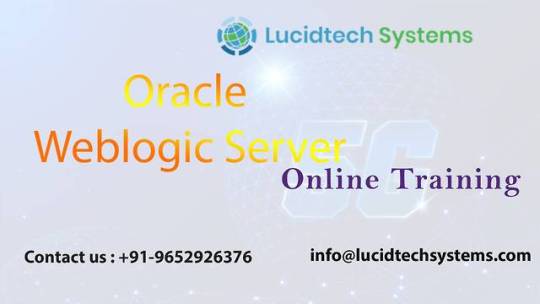
Oracle WebLogic Server Online Training-LucidTechSystems offers best Oracle WebLogic Server Online Training in Hyderabad. WebLogic Server Corporate Training, Oracle Fusion Middleware Admin with live industry projects.
0 notes
Photo
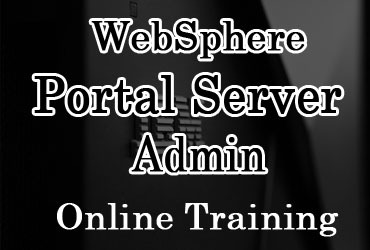
(via Oracle Weblogic Server Online Training from India, Best Oracle Weblogic Server online training institute in Hyderabad.)
0 notes
Text
300+ TOP CloverETL Interview Questions and Answers
CloverETL Interview Questions for freshers experienced :-
1. What is CloverETL? CloverETL is a Java-based data integration ETL platform for rapid development and automation of data transformations, data cleansing, data migration and distribution of data into applications, databases, cloud and data warehouses. The product family starts with an open source runtime engine and limited Community edition of visual data transformation Designer. 2. What is ETL? ETL stands for Extract-Transform-Load – a data processing operation that performs data manipulations, usually on-the-fly, while getting (extracting) data from a source or sources, transforming it, and storing into target(s. For more information, see the Wikipedia page for ETL. 3. What is data integration? Data integration is a broad term used for any effort of combining data from multiple sources into a more unified and holistic view. It usually involves several operations, such as ETL, orchestration, automation, monitoring and change management. 4. What's the difference between ETL and data integration? ETL is a form of data integration where data is transformed during transport between sources and targets. While "pure" ETL is focused on the actual transport, data integration usually refers to a broader task of managing ETL tasks, scheduling, monitoring, etc. 5. Why use an ETL tool and why CloverETL in particular? ETL or data integration tools replace ad hoc scripts that you would use to transport data between databases, files, web services etc. Over time, these become very difficult to manage and are prone to errors. ETL tools provide you with visual tools to manage, monitor, and update data transformations with ease. CloverETL in particular is a rapid data integration tool oriented to get your job done quickly. 6. What is CloverETL Designer? CloverETL Designer is a visual tool for developing, debugging, and running data transformations. 7. What is CloverETL Server? CloverETL Server is an automation, orchestration and monitoring enterprise platform for data integration. 8. What is CloverETL Cluster? CloverETL Cluster allows multiple instances of the CloverETL Server to run on different HW nodes and form a computer cluster. It allows for high availability through fail-over capabilities, scaling via load balancing, and processing of Big Data through a massively-parallel approach. 9. Which platforms or operating systems does CloverETL run on? CloverETL runs on any platform/operating system where Java 1.6 or later is supported. This includes Windows, OSX, Linux, various UNIX systems and others. 10. Is there a free option for CloverETL? Yes. There is a 45-day fully featured trial for CloverETL Designer and a trial CloverETL Server (contact [email protected]. There is also a completely free, but feature-limited CloverETL Community Edition.

CloverETL Interview Questions 11. When and how are new versions released? There are two major production releases every year. Before each production release, there are two milestone releases that allow early access to new features from the upcoming production version. Production releases are sometimes replaced with bugfix releases that come as needed. 12. What are milestone (M1, M2) releases? Milestone releases provide early public access to features that we're working on for the upcoming production release. You can use milestones and their new features to develop, test, and provide us with feedback. However, milestone releases are not covered by CloverCARE support, so we do not recommend putting them into a mission critical deployment. Major changes that can affect existing transformations are usually published in early milestone versions so that you have plenty of time to adapt to possible incompatibilities. 13. Do I need to renew CloverCARE? Your CloverCARE support is covered by an 20% annual maintenance fee that grants you access to product updates and standard CloverCARE support. To continue receiving upgrades and support, you need to renew your maintenance every year. 14. Are there any discounts (academic, non profit, volume) available? We can offer discounts for various types of organizations and businesses. We can also offer volume deals. Please contact our Sales at [email protected] or via this Contact Us form. 15. What makes CloverETL stand out against SSIS/Talend/Pentaho? CloverETL is a rapid data integration tool. Our main goal is to provide our users with a tool that helps them achieve results quickly, without having to spend time on training, learning, etc. Starting from our examples, you can begin building data transformations quickly. CloverETL is also sharply focused on data integration – it’s a light-footed, dedicated tool. 16. What is CloverCARE and what does it include? CloverCARE is our support package included in every commercial deal. Members of our support team are professional experts who are using CloverETL themselves – no outsourcing, no frustrating phone calls. We also support evaluating users during their trial period. CloverCARE offers email, phone, and WebEx support at various SLAs. Please refer to our CloverCARE Support page for more details. 17. Which versions of application servers does CloverETL Server support? Currently CloverETL supports Apache Tomcat 6.0.x, Glassfish 2.1, JBoss 5.1 or JBoss 6.0, Jetty 6.1.x, WebLogic 11g (10.3.6), WebLogic 12c (12.1.1), Websphere 7.0 18. Can CloverETL be embedded in my product? The short answer is yes. CloverETL technology can be embedded in various ways. You can embed CloverETL Designer, CloverETL Server or even just the data processing engine running under the hood. Some of our customers also use white-labeled CloverETL technology in their product offerings. For additional details, please read our OEM section. 19. How scalable is CloverETL? CloverETL technology scales really well. You can start with the CloverETL Designer running on your laptop processing thousands of records then move onto the CloverETL Server with its automation capabilities to crunch millions of records. If you happen to hit any Big Data problems, then the CloverETL Cluster is able to cope with any data volume through its massively-parallel data processing capabilities. 20. Does CloverETL support Big Data? CloverETL technology naturally fits the processing of Big Data. Its inherent pipeline-parallelism and massively-parallel processing facilitated by CloverETL Cluster allows you to cope with Big Data problems. It’s also able to cooperate with other Big Data related technologies like Hadoop, Hive, and others. 21. What kind of data can I process in CloverETL? CloverETL can process any structured or semi-structured data whether stored in a database, file, or other system. Data sources and data targets alike can be a combination of various independent databases and files. 22. How do I get my newly purchased licenses? You'll receive an email with your account information (email and password) that you can use to Sign In here. From there, navigate to Licenses & Downloads where you can get both license keys and download all the software. 23. How do I transition from Designer to Server? There is a direct upgrade path from the desktop Designer to the Server environment. Your already existing work can be transferred to the Server without any additional effort. Designer manages projects in workspaces on your local drive. You can simply export these to Server sandboxes (via File > Export > CloverETL > Export to CloverETL Server sandbox) and continue working remotely on the Server. 24. How do I transition from Server to Cluster? CloverETL Cluster is basically a bunch of Server instances connected together into a single cluster. When you move into Cluster, we recommend reading about various types of sandboxes and how to process data in parallel 25. I purchased CloverETL, but my license is set to expire in two months. Why? If you feel there's been an error, please contact our Sales at [email protected] or via this Contact Us form. Usually we issue temporary licenses immediately once a Purchase Order is received. We then replace the temporary licenses with unlimited ones once the payment is processed. 26. My evaluation license expired. Is it possible to extend the evaluation period? Yes, you can ask for trial extension here. 27. Do you have any plans for selling the company or being taken over? Our mission is to be a leader in data integration and stay true to providing high quality product and services. You can read more in this CloverETL Manifesto. 28. What files are supported? You can process virtually any file containing data, including delimited files, fixed-length record files, binary files or mix of these. Popular file formats are also supported: Excel XLS/XLSX, XML, JSON, dBase DBF, emails, Lotus Notes Domino. 29. What databases are supported? CloverETL supports standard relational databases via JDBC. Others include Oracle, Informix, Microsoft SQL Server, Access, MySQL, Postgres, Sybase, etc. Also, some modern NoSQL or columnar databases are supported too, e.g. MongoDB, Exasol, HP Vertica, HDFS or S3. 30. Can I read and write remote files (FTP, SFTP, HTTP/S, etc.)? Yes. Please refer to Supported File URL Formats for Readers and Supported File URL Formats for Writers. 31. Can I read and write data using Web Services or REST APIs? Yes. There are dedicated components for that: WebServiceClient and HTTPConnector. Also, many components support remote data - please refer to Supported File URL Formats for Readers and Supported File URL Formats for Writers. 32. Do you support Apache Hadoop and/or Hive? Yes, Hadoop is supported for both HDFS storage, as well as running MapReduce jobs. Hive is also supported. Please refer to Hadoop connections, Hive connection. 33. Can I use data from cloud providers such as Amazon S3? Yes, you can access data on Amazon S3. For more please read Supported File URL Formats for Readers and Supported File URL Formats for Writers. 34. How do I use Designer to develop on the Server? Do I need to deploy? The Designer connects directly to Server sandboxes so you're working live on the Server. There is no need to deploy your local edits or anything. Whenever you're connected to a Server sandbox and run a transformation or jobflow, it is executed on the Server, not locally. 35. Can I run a transformation without Designer? How? Yes, CloverETL Server provides numerous automation functions, including scheduled execution, web services, event listeners, etc. 36. Can CloverETL Server be deployed to Amazon EC2? Yes, there are several projects running CloverETL hosted on Amazon EC2 servers. As data transformations are heavy on I/O, make sure you pick a "high I/O" instances. The installation does not require any additional tricks. 37. Can CloverETL handle secure data transfers (HTTPS, SFTP, FTPS, etc.)? Yes, you can access all of these protocols. For more please read Supported File URL Formats for Readers and Supported File URL Formats for Writers. 38. Can sensitive information, such as passwords in connections, be securely hidden? Yes, CloverETL Server supports encrypted secure parameters so that sensitive information are not stored in plain-text readable form in graphs, connections etc. 39. Can I use projects developed in Trial (or Community) in commercial an vice versa? Yes, everything that you create in Community or Trial can be opened and further developed in any commercial edition of CloverETL. However, CloverETL Community cannot run all transformations created using the Trial or commercial products due to its limitations. 40. Can I create my own custom component or function via a plugin? Yes, there are two nice articles you can read on our blog to help you do so: Creating your own component and Custom CTL functions. 41. How do I upgrade CloverETL Designer to the latest version? We recommend uninstalling the old version and performing a fresh install of the new one. Don’t worry, all your work is safe – it’s always stored outside the installation files. 42. Do I need an application server to run CloverETL Server? If yes, which one? We provide a default, easy-to-start bundled package of CloverETL Server with pre-configured Apache Tomcat and Derby database. It's a good, simple start. However, if you wish to use an application container of your own, CloverETL supports a number of industry standard J2EE application servers such as Apache Tomcat, GlassFish, Weblogic, WebSphere, JBoss and Jetty. CloverETL Questions and Answers Pdf Download Read the full article
0 notes
Text
WEBLOGIC TRAINING
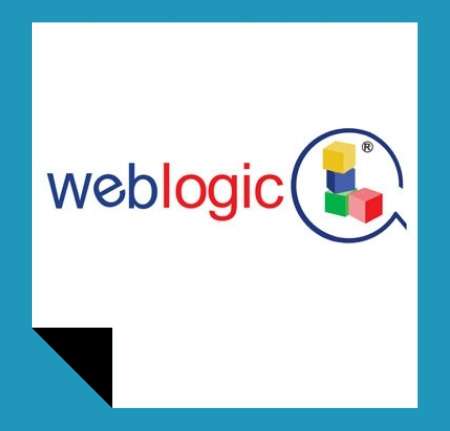
Introduction to Weblogic Training:
Weblogic Training is also a Java Enterprise Edition application server. It is a software application launched by Oracle Corporation. It is foremost e-commerce online transaction processing platform, lets you to quickly build up and run reliable, secure, scalable and controllable applications. So, you can focus on business logic and presentation, why because it manages system-level operations. Global Online Trainings provide Weblogic 12c Administrator Training by real-time industry experts.
http://globalonlinetrainings.com/weblogic-training/
0 notes
